TV Movie about Chiara Lubich: Interview with Cristiana Capotondi
Interview with Cristiana Capotondi, the actress who plays Chiara Lubich in the TV movie about her. https://vimeo.com/490442043
Interview with Cristiana Capotondi, the actress who plays Chiara Lubich in the TV movie about her. https://vimeo.com/490442043
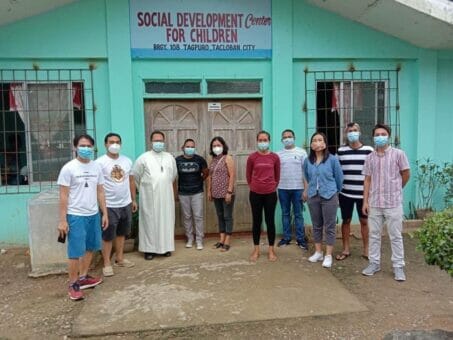
Four stories of those who “dare to care” every day: because there is no need to wait for World Peace Day to build a more united world. “May we never yield to the temptation to disregard others, especially those in greatest need, and to look the other way; instead, may we strive daily, in concrete and practical ways, “to form a community composed of brothers and sisters who accept and care for one another” The concluding words of Pope Francis’ message for January 1st 2021, the 54th World Day of Peace. .These words are a revolutionary programme for the lives of people and peoples for 2021 in which infinite hopes for peace are placed; a peace which goes from the fight against poverty, to a greater dignity of the person, to working to resolve all forms of conflict, and lastly (but not least) the safeguarding of the planet. We start this year 2021 with stories we have entitled ‘caring heroes ‘: people like us, or those who live next door to us, who have not missed out on precious opportunities to love and be close to others in the most diverse areas. The operating ground for caring is vast: it is as big as the world. Teens for Unity (Mexico) – “We wanted to carry out a project that had both a social and environmental impact, and we came up with the idea of collecting plastic cups to donate to a foundation that takes care of people suffering from cancer, to help them with the proceeds of our collection. In this way we have helped to respect the environment by recycling plastic and helping these people undergoing treatment. To date we have made 23 deliveries with a total of one million cups collected in less than a year! In addition to this we have collected recyclable waste and, with the proceeds, delivered food to the hospital, clothes to people with limited resources and helped nursing homes. We also planted trees in some parts of the city. 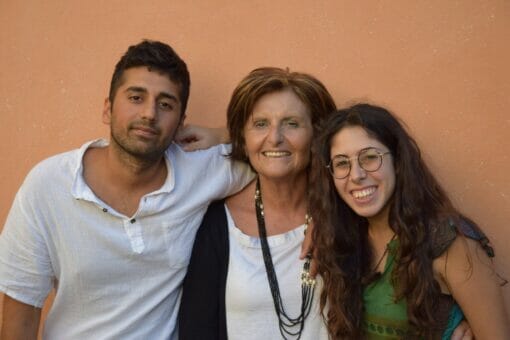 Sandra Mugnaioni (Italy), a retired teacher – At the Copernico High School in Prato, she has been carrying out a number of projects for about 20 years that make students ‘active citizens’. One of the most interesting projects is that of Peer Educators: the students choose a theme, in agreement with the teachers who support the project, which is different each year: they research the theme, explore the various facets of the chosen theme, then decide what to do. Last year the theme was what is called ‘ecomafias'”. At the end of the course, 700 students from the city’s high schools performed a play, Gardugña, (the Spanish for Our Thing). “In this way the students gain an awareness and the skills to become peer educators, even to those most in difficulty. Then these peer educators, once they graduate, continue to look for opportunities to do good and they do not let their teachers off the hook, so much so that the experience, in high schools and elsewhere, is shared and built on by an increasingly larger group of teachers”. Rolando (Guatemala) – Rolando is the owner of Spokes Cafe . Two years ago, he visited a shelter near his neighbourhood and met Madelyn, to whom he offered work as a barista. He explains: “We try to make our café a springboard for young people like Madelyn, teaching them a trade, so as to break that vicious circle and prepare them to face the world with dignity. Often, they decide to go on to university, and this fills us with joy”.
Sandra Mugnaioni (Italy), a retired teacher – At the Copernico High School in Prato, she has been carrying out a number of projects for about 20 years that make students ‘active citizens’. One of the most interesting projects is that of Peer Educators: the students choose a theme, in agreement with the teachers who support the project, which is different each year: they research the theme, explore the various facets of the chosen theme, then decide what to do. Last year the theme was what is called ‘ecomafias'”. At the end of the course, 700 students from the city’s high schools performed a play, Gardugña, (the Spanish for Our Thing). “In this way the students gain an awareness and the skills to become peer educators, even to those most in difficulty. Then these peer educators, once they graduate, continue to look for opportunities to do good and they do not let their teachers off the hook, so much so that the experience, in high schools and elsewhere, is shared and built on by an increasingly larger group of teachers”. Rolando (Guatemala) – Rolando is the owner of Spokes Cafe . Two years ago, he visited a shelter near his neighbourhood and met Madelyn, to whom he offered work as a barista. He explains: “We try to make our café a springboard for young people like Madelyn, teaching them a trade, so as to break that vicious circle and prepare them to face the world with dignity. Often, they decide to go on to university, and this fills us with joy”.  Madelyn is 21 years old and went to the shelter with her sister. Those who live there are mostly young victims of abuse and exploitation. Some have even been part of a human trafficking scheme. Although the young women are safe in this shelter, many suffer from the stigma attached to living in such a place, and rarely manage to find decent work. Madelyn says that she has always found it difficult to communicate with people: “I still have a long way to go but I am learning little by little. Working here I have discovered a sense of responsibility and that behind every customer there is a person. This job has marked a turning point in my life”.
Madelyn is 21 years old and went to the shelter with her sister. Those who live there are mostly young victims of abuse and exploitation. Some have even been part of a human trafficking scheme. Although the young women are safe in this shelter, many suffer from the stigma attached to living in such a place, and rarely manage to find decent work. Madelyn says that she has always found it difficult to communicate with people: “I still have a long way to go but I am learning little by little. Working here I have discovered a sense of responsibility and that behind every customer there is a person. This job has marked a turning point in my life”.  Maria Liza (Philippines), Chief Prosecutor, Tacloban – The Social Development Centre for Children (SDCC) is a shelter for children located in the northern part of Tacloban City, the island that was severely affected by Typhoon Haiyan in 2013. Today, the centre is in dire straits due to lack of funding. Maria Liza recounts: “So, we went to our mayor and proposed, to start raising funds to cope with the lack of food and medicine, but we also took on board reporting instances of child abuse. But the most important achievement was that we managed to bring the centre to the attention of the public. If we hadn’t gone in there, no one would have admitted to what their living conditions were like. This has created a kind of public ‘concern’ so that the city administration can really take care of these children”.
Maria Liza (Philippines), Chief Prosecutor, Tacloban – The Social Development Centre for Children (SDCC) is a shelter for children located in the northern part of Tacloban City, the island that was severely affected by Typhoon Haiyan in 2013. Today, the centre is in dire straits due to lack of funding. Maria Liza recounts: “So, we went to our mayor and proposed, to start raising funds to cope with the lack of food and medicine, but we also took on board reporting instances of child abuse. But the most important achievement was that we managed to bring the centre to the attention of the public. If we hadn’t gone in there, no one would have admitted to what their living conditions were like. This has created a kind of public ‘concern’ so that the city administration can really take care of these children”.
Stefania Tanesini
For the full stories visit the United World Project webpage
A few moments from the past year and key images from Emmaus’ terms as President. https://vimeo.com/490450265
The Giorgio La Pira International Student Centre in Florence promotes a culture of dialogue, welcome and respect to help us rediscover we are all members of one human family. “Attending the La Pira Centre made us realise that the school was fundamental to building a future of peace and serenity, and inspired us to create something that would enable lots of children to receive a good education”. Armand José and Armand Xavier Mabiala are two young brothers from Angola. The first graduated in economics in Florence, the second is studying civil engineering. Both attended the Giorgio La Pira International Student Centre in the Tuscan capital where they took courses in Italian and participated in cultural activities, and made friends with young people from different backgrounds, cultures and religions. It is a place that has become such a point of reference for them that they want to take the values it expresses back to their own country. Founded in 1978 at the request of Cardinal Giovanni Benelli, Archbishop of Florence, to support students from other countries, and entrusted to the Focolare Movement, the Centre is dedicated to Giorgio La Pira – who was one of the founding fathers of the Italian Republic and mayor of the city between 1951 and 1965. Its purpose is to be “a place of fraternal welcome, encounter and dialogue” – according to its website www.centrointernazionalelapira.org – a “door opening on a Europe that is willing to give as well as receive, to learn from everyone”. Its horizon is “the dream of the Gospel, the ideal of universal brotherhood, the dream of Peace whose goal is a united world”. Having received a sum of money from their father the two brothers, instead of spending it on themselves, decided to invest in something they considered more important for their country, on education, as an instrument for peace, development and well-being. They have built a school in Luanda, Angola’s capital which is also named after Giorgio La Pira and takes its inspiration from the ideal of universal fraternity. This is just one of the many stories told at the La Pira Centre and speak of welcome, solidarity and friendship between people of different origins, convictions, faith and culture, even during this time of pandemic. Mohamed Abou El Ela is a Florentine student, a member of the board of Young Italian Muslims and secretary of the Islamic Community of Florence and Tuscany. Together with other young Muslims and with the support of the Islamic community, Caritas, the Food Bank and the La Pira Centre – which he attended with his friends – he has formed a group of thirty people who bring relief to hundreds of students and families in difficulty, and volunteer for the Red Cross, Misericordia and the Caritas canteen. “In difficult times we must not act separately but in a more united way,” he explains. “This is the lesson we have learnt from the crisis imposed on us by Covid19. A story of sharing and cooperation that overcomes ideological barriers, emphasising how we are all members of one human family. This is the spirit underpinning every activity and every project at the La Pira Centre.
Claudia Di Lorenzi
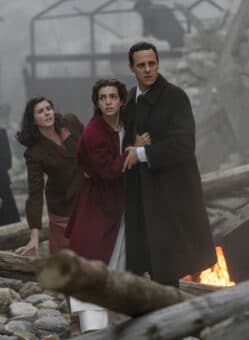
What is the main idea behind the TV Movie “Chiara Lubich, love conquers all”? What does the story of the beginnings of the Focolare Movement have to say in today’s world? Presented to the press today, it will be broadcast during prime television time on 3 January on RAI Uno. An extremely topical film, which has something to say to all of us, by offering the universal fraternity brought by Chiara Lubich as an antidote to the evil in today’s world. This, in a nutshell, was the message that emerged today during the press conference for the presentation of the TV Movie “Chiara Lubich, l’amore vince tutto” (“Chiara Lubich, love conquers all”) to be broadcast on Rai Uno (Italy’s number one national channel) on 3 January, during prime viewing time. The press conference was attended by the director of Rai Uno – Stefano Colletta, the head of Rai Fiction – Maria Pia Ammirati, Eliseo Multimedia producer – Luca Barbareschi, the leading actress – Cristiana Capotondi and the actress Aurora Ruffino. Maurizio Fugatti, the president of the Province of Trent where the film was shot, also spoke. “It is a film that in this period of great suffering which is so hard for us just like this Covid period, becomes a powerful metaphor of hope and courage. A group of young people who decide to believe in a dream. When? During the war”. This was the gamble Luca Barbareschi decided to take in producing the story of Chiara Lubich. “I hope this film is seen in a light where the figure of Chiara (…) becomes a symbol of simplicity and passion, of courage, of the desire to bring people back together. The symbol of the hearth (focolare), being around the fire, around a light”. 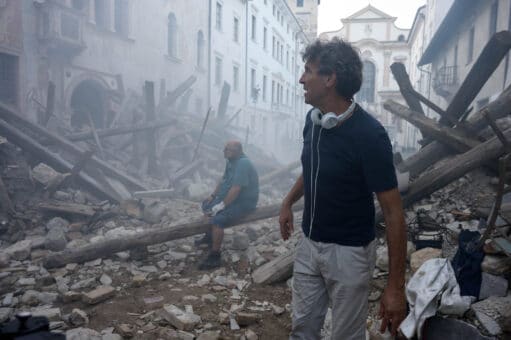 Italian screenwriter, Giacomo Campiotti, agreed, whilst admitting that this had been the most difficult script he had ever written, an exciting undertaking nevertheless. “I tried to make my contribution by telling a story for everyone,” he explained. “Chiara Lubich is by no means a story just for the Christian world. Her idea was to speak to everyone”. Recalling that Chiara’s motto was the Gospel phrase “That all may be one” (cf. Jn 17:21), he added: “Chiara did not want to found anything but each of us has incredible power. When a person begins to realise what they believe in, they create a magnetism around them that changes the world. This is what great characters have done. And these characters can be of great help, a great inspiration to everyone.”
Italian screenwriter, Giacomo Campiotti, agreed, whilst admitting that this had been the most difficult script he had ever written, an exciting undertaking nevertheless. “I tried to make my contribution by telling a story for everyone,” he explained. “Chiara Lubich is by no means a story just for the Christian world. Her idea was to speak to everyone”. Recalling that Chiara’s motto was the Gospel phrase “That all may be one” (cf. Jn 17:21), he added: “Chiara did not want to found anything but each of us has incredible power. When a person begins to realise what they believe in, they create a magnetism around them that changes the world. This is what great characters have done. And these characters can be of great help, a great inspiration to everyone.” 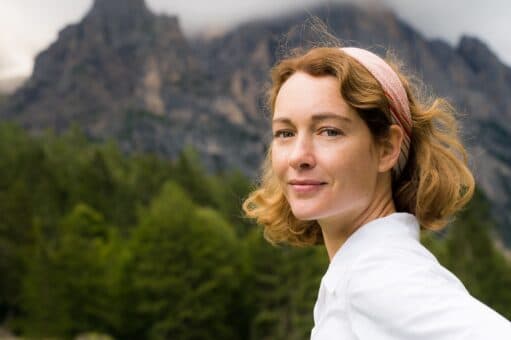 “I take home a really beautiful experience of great spirituality, few things have been as all-encompassing,” confides Cristiana Capotondi. For the leading actress, Chiara Lubich is someone who has always remained young, “because she had the strength to challenge conventions and stereotypes, open doors, talk to the Jewish world, talk to the Islamic world, talk to the Orthodox Church. It is as if she had no memory, no superstructures. I personally find this very youthful. When we grow up we become structured, we start having fears. She was a woman who had no fears. At this current moment in history, I believe her message has extraordinary political strength.
“I take home a really beautiful experience of great spirituality, few things have been as all-encompassing,” confides Cristiana Capotondi. For the leading actress, Chiara Lubich is someone who has always remained young, “because she had the strength to challenge conventions and stereotypes, open doors, talk to the Jewish world, talk to the Islamic world, talk to the Orthodox Church. It is as if she had no memory, no superstructures. I personally find this very youthful. When we grow up we become structured, we start having fears. She was a woman who had no fears. At this current moment in history, I believe her message has extraordinary political strength.  Aurora Ruffino who plays an important role as one of Lubich’s first companions said she was struck by how Chiara and her companions also lived with the uncertainty of tomorrow: “A situation similar to what we are living today. In spite of this, she was absolutely certain that things would go well, that God would somehow find a way to make things go well for her. That really struck me. (…) When you do good it always comes back to you. And she lived absolutely certain of this”. Stefano Coletta is in no doubt as to why RAI Uno chose to open 2021 with this project: “The film condenses the story of Chiara Lubich in a very straightforward manner and without rhetoric. The story of a woman who had truly encountered God and had encountered him in action, rather than in mysticism and contemplative activity. She was a very practical woman who lived during a very complicated time like the war with an almost political conviction that every encounter deserved attention, curiosity and intelligence. It is no coincidence that she was a sign of ecumenical dialogue right to the end; she encountered extremely diverse spiritualities without prejudice”. For Maria Pia Ammirati, the story told in the film has a hagiographic character, but not in the usual sense of the word. “Like all real hagiographies, the saints are first and foremost normal men and women. That’s why 2021 is getting off to a really good start. This story is a viaticum and a positive start in a situation that we know is dark and allienating. Chiara’s design was that of rapprochement, starting from small societies, solidarity, the common good and love, as it says in the film’s title”.
Aurora Ruffino who plays an important role as one of Lubich’s first companions said she was struck by how Chiara and her companions also lived with the uncertainty of tomorrow: “A situation similar to what we are living today. In spite of this, she was absolutely certain that things would go well, that God would somehow find a way to make things go well for her. That really struck me. (…) When you do good it always comes back to you. And she lived absolutely certain of this”. Stefano Coletta is in no doubt as to why RAI Uno chose to open 2021 with this project: “The film condenses the story of Chiara Lubich in a very straightforward manner and without rhetoric. The story of a woman who had truly encountered God and had encountered him in action, rather than in mysticism and contemplative activity. She was a very practical woman who lived during a very complicated time like the war with an almost political conviction that every encounter deserved attention, curiosity and intelligence. It is no coincidence that she was a sign of ecumenical dialogue right to the end; she encountered extremely diverse spiritualities without prejudice”. For Maria Pia Ammirati, the story told in the film has a hagiographic character, but not in the usual sense of the word. “Like all real hagiographies, the saints are first and foremost normal men and women. That’s why 2021 is getting off to a really good start. This story is a viaticum and a positive start in a situation that we know is dark and allienating. Chiara’s design was that of rapprochement, starting from small societies, solidarity, the common good and love, as it says in the film’s title”.
Stefania Tanesini
From the Conference Call “Unity” – Rocca di Papa, September 26th, 1996. https://vimeo.com/490435602